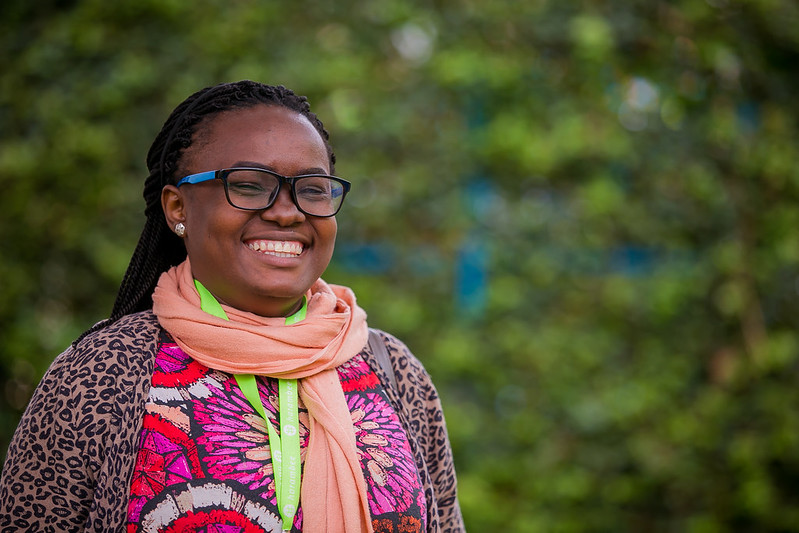Building a Gender Equal Workforce

By Angela Rugo and Hannah Adams
International Women’s Day is an opportunity to reflect on the progress our societies have made and to recommit to building a world where all young women have the chance to realise their full potential, regardless of their gender or background. According to the McKinsey Global Institute, the COVID-19 pandemic has disproportionately affected women and further exacerbated gender inequality. Women around the world are more vulnerable to the effects of the pandemic due to the unbalanced burden of unpaid work such as childcare, household chores and caring for the elderly.
Indeed, many sectors hit hardest by the pandemic are gendered in nature – tourism and hospitality, health, as well as education are just a few examples. The informal sector – crippled by the pandemic – is majority female. Findings from the Labour Force Survey, indicate that in 2019, 91.2% women were informally employed.
By taking a gender lens to removing barriers to employment, Harambee Youth Employment Accelerator has learnt a number of lessons as we build African solutions to the global challenge of youth unemployment. We know that these barriers are higher for women than men. In the last three years of supporting young Rwandans to secure income-generating opportunities, we have identified four key lessons that we know can enable women to reach their full potential.
Lesson 1: Design interventions for the realities of women
Ernestine Turabayo is a young mother living in Kigali who provides for her family alongside raising her child. Previously, she didn’t have the time or money to attend Harambee’s four week in-person English Acceleration Programme. It was only after we began offering online training that she was able to participate. Ernestine told us: “Studying online meant there were no transport costs and there was less pressure to get to class on time, especially after settling my baby and household up for the day. Most of all, being able to study and gain English and workplace skills while still caring for my child gave me peace of mind. I think it was the best choice Harambee made for us.”
Our fifth English Acceleration cohort saw a 10% increase in female completion – up to 53% from 43% for our previous four cohorts, which required in-person participation. By designing online and flexible programmes for women’s realities, which often include household and familial responsibilities, we have seen increased participation and completion of programmes that are now specifically designed to open more earning opportunities for them.
Lesson 2: Provide women with safe spaces for peer learning and support
Since we began working in Rwanda, we have seen less participation from women in our programmes (41% on average). To address this, and draw on the early successes of women-focused sessions with partners like Fawe and Maranyundo Girls school, we introduced women-only online Work-Seeker Support (WSS) sessions. We quickly realised the enthusiasm among some women for this offering. Divine, who attended one of the sessions, told us: “I signed up for the women’s only Work-Seeker Support because I wanted to learn and gain skills from other women. Being in the same group made me feel more comfortable and confident to share ideas and ask questions. I learned that, as women, we shouldn’t be afraid to try and we should be proud of ourselves.”
By creating spaces for women to share their experiences in finding a job and building their networks, Harambee aims to empower and accelerate their pathways to learning and earning opportunities.
Lesson 3: Shift gender norms and work with like-minded partners
Joselyne Iradukunda was one of the first candidates Harambee pathwayed to an opportunity with one of our employer partners, Volkswagen Mobility Solutions. VW was looking to hire drivers and was equally committed to making the opportunity available to women – even though driving in Rwanda is often seen as a traditionally male role. According to Joselyne, “As a young woman, it wasn’t easy but the professional skills like discipline, being on time, and good communication I learned from Harambee helped me to perform at my best. After just four months, I was promoted from a driver to a supervisor of other drivers.”
This outcome was made possible thanks to the shared commitment of Harambee and VW to make all opportunities open to women, and a commitment to supporting them in their employment journey.
Lesson 4: Lift up role models
Rwanda stands out for its commitment and achievements in elevating women to leadership positions. Female representation in Parliament stands at 61% and women’s representation in middle management in the private sector has increased by 27%, according to McKinsey. We have learned that in addition to supporting young women, sharing success stories is a critical force multiplier. This inspires more young women to keep progressing in their employment journey. Sharing stories on radio, social media and in our programmes has allowed women to see the diverse career pathways other women have navigated, and therefore made subsequent paths much clearer.
Incorporating these lessons has enabled us to lower the barriers for women to both training and employment opportunities, but there is more work to be done to remove those barriers completely. On International Women’s Day, Harambee is committed to continuing to learn, iterate, and scale to achieve gender equity in earning opportunities for Rwanda’s young people.
Angela and Hannah work with Harambee Youth Employment Accelerator in Rwanda, a social enterprise that partners with the government, private sector and young people to accelerate youth employment.


